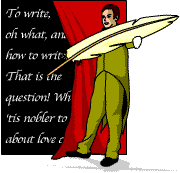Writing Right with Dmitri: What I'm going to read this summer
Created | Updated Aug 19, 2012
Words, words, words. That's what we're made of. Herewith some of my thoughts on what we're doing with them.
Writing Right with Dmitri: What I'm going to read this summer

I've just sent away for this book. By snail mail. When it gets here, I'm going to devour every single page. How can I write a review of a book I don't have yet? Because I'm buying it to resupply my childhood memories, lost in all of yesterday's newspapers and the souvenir books that are probably in my sister's attic now.
Pogo was the first thing I turned to in the newspaper every day. Pogo was my hero – the Everyman possum of Okefenokee Swamp, who with his philosopher friend Porkypine, pretty much explained the world to me in appealing line drawing and glorious dialect prose. Poetry, too, sometimes: who could forget that Cold War classic?
For spring has sprung the cyclotron,
How high browse thou, brown cow?
Walt Kelly was a national – nay, a world treasure. Kelly was far and away ahead of his time in introducing political and social commentary and satire to the comics pages of our newspapers. His critters' interest in grassroots politics inspired college students during the 1952 election to sport 'I Go Pogo' buttons, in gentle mockery of Eisenhower's 'I Like Ike' campaign. Kelly was an equal-opportunity offender: he annoyed Communists AND Anti-Communists, Democrats and Republicans, anti-environmentalists, anti-feminists, and retrograde thinkers of all stripes. Kelly's work, though wildly popular, was at different times banned in Havana, Moscow, China. . . and Providence, Rhode Island.
The Providence story is both funny and illustrative. When Kelly satirised McCarthy's Red-baiting by drawing the senator's face on a hillbilly bobcat named Malarkey, the editor of the Providence paper objected. This was long before journalists such as Edward R Murrow spoke out against McCarthy – he was popular then, and the Providence paper announced it was banning Pogo from its pages whenever 'Senator McCarthy's face appears'. Kelly did a wonderful thing: as one of the strip's characters was a 'Rhode Island Red' chicken, he had Malarkey announce that 'she's from Providence, and nobody from Providence can see my face.' Whereupon the bobcat and his henchman donned pillow cases over their heads – obscuring the offending face, but also making him look like a member of the Ku Klux Klan.
The Providence paper gave up, and ran Pogo on the OpEd page.
Over the years, Kelly drew Khrushchev as a pig, Fidel Castro as a goat, and US Vice President Spiro T Agnew as a hyena in a doorman suit (a reference to Agnew's expensive refurbishing of Secret Service uniforms). He was an environmentalist before it was popular. His feminist heroine, Miz Beaver, campaigned for respect and defended her pet fish (which she carried under her arm). He demanded critical thinking from his reader, and coined the now-famous phrase:
We have met the enemy, and he is us.
And oh, the poetry of his language. Kelly, from Bridgeport, Connecticut, the birthplace of PT Barnum, could not have been more Yankee, but we Southerners embraced him as one of our own. His dialogue, just this side of Joycean, had a seductive quality that was unique. Every Christmas, he gently, gently railed against the commercialisation of the holiday, as his characters butchered carols for all they were worth:
Deck us all with Boston Charlie,
Walla Walla, Wash, and Kalamazoo.
Nora's freezing on the trolley,
Swaller-dollar cauliflower, alley-ga-roo.
That may not be spelled right, as I'm quoting from memory. Stuck in your mind, did the works of Walt Kelly. Delightful, funny, beautiful from the first, and an education for young and old. The drawings and sentiments are as timely now as they were during the Cold War. I only wish Kelly were still around to mock a few more politicians, and to remind us, in the words of Porkypine:
Don't take life so serious, son. It ain't nohow permanent.
So, yes, I'm looking forward to this book. A lot. I hope a lot of younger readers are, too. So why am I telling you about this in a writing column? I'm hoping you'll investigate the works of Kelly for yourselves, and learn a few tricks from the old master. After all, I cannot think of a single other artist or writer for whom the mere mention of the name evokes such a response of 'aw, shucks, yes. . . ' followed by a fond smile – when all the man ever did was hold the evils of society up to the light. He did it with warmth, however, and without a trace of bitterness or adversarial feeling. We should all want to 'go and do likewise'.
Writing Right with Dmitri Archive
